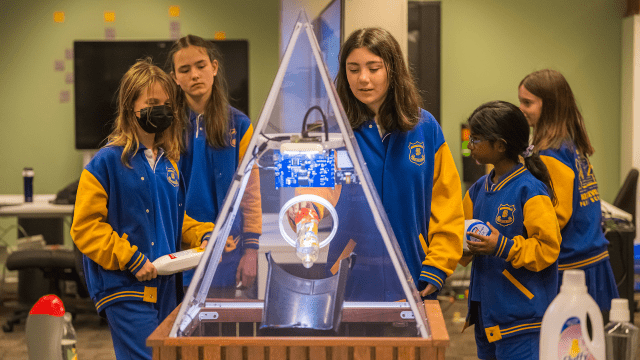CSIRO and UTS have used Science Week to show off a prototype ‘smart bin’, getting year six students from Marrickville Public School in Sydney’s inner west to test the feasibility of the tech to see how it interacts with construction materials made from recycled glass and polystyrene.
According to the Commonwealth Scientific and Industrial Research Organisation (CSIRO), the smart bin technology uses Internet of Things (IoT), sensing, robotics, artificial intelligence (AI) and infrared spectroscopy technologies to automatically sort plastic, metal and glass, as well as sorting specific types of plastic.
The bin is still in proof-of-concept stage, but there’s a website that explains exactly what they’re hoping to achieve, and how. It also maps locations of the bins and how full they are, as well as a dashboard displaying recycling stats. There’s a video we couldn’t embed, so head on over to check it out.
The smart bin is designed to improve recycling rates and reduce contamination in waste streams. The motivation? NSW only recycles 10 per cent of its 800,000 tonnes of plastic waste, which is a staggering stat.
UTS hopes their smart bin will help to produce high-quality recycled material and build Australia’s circular economy. It also supports turning waste into a resource. This smart bin technology, CSIRO said, could be used at venues such as shopping centres, schools, cinemas, coffee shops and airports.
“It will improve recycling rates because it is so easy to use and could ensure that materials can be recovered for reuse,” CSIRO principal research scientist Wei Ni added.
“We can’t underestimate how small changes can make a huge difference. It’s great to see the next generation are learning that.”
Victorian small business Casafico create commercial construction materials from recycled glass, newspaper and polystyrene, much of which is sourced through online waste exchange marketplace ASPIRE, which spun out of CSIRO in 2013. They’re invested in the smart bin project for obvious reasons. A circular economy with a massive reduction in waste – it sounds rad.
This article has been updated to reflect that the kids were in the lab for a demonstration, not because it’s their idea or prototype. The prototype was developed by researchers from UTS and CSIRO.
